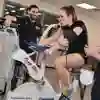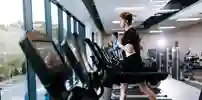





Harness the power of nutrition to enhance performance and improve lives.
This degree equips you with the scientific knowledge and practical skills to support both athletic excellence and public health through evidence-based practice.
You’ll develop a strong foundation in core disciplines – including physiology, psychology, biomechanics and nutrition – preparing you for a career in health, sport, or exercise-focused roles.
With access to real-world placements, applied projects, and strong industry links, you’ll gain valuable experience and a competitive edge in an evolving and in-demand field.
About this course
What you eat can shape how you train, perform, and recover. On our BSc Sport and Exercise Science with Nutrition degree, you’ll discover how science and nutrition combine to boost athletic performance and improve public health.
You’ll explore areas like physiology, biomechanics, psychology and sports nutrition - then put your knowledge into action through hands-on placements with organisations such as Hull City, Hull KR, Hull FC, the NHS, schools and public health providers.
With access to cutting-edge facilities including motion capture labs, an environmental chamber, a specialist kitchen and strength and conditioning suites, you'll build the skills to stand out in a competitive industry.
You’ll have the chance to showcase your final-year project at our Student Thesis Conference, celebrating your research alongside fellow students and professionals. It’s a fantastic way to develop presentation skills, make even more industry connections, and share your passion for sport and exercise science - learn more here.
Whether you're aiming for elite sport, clinical settings or community health, this course gives you the confidence, experience and expertise to make an impact.
Fuel performance, improve lives
Module options
Each year, you’ll study modules worth a certain number of credits, and you need 120 credits per year. Most modules are 20 credits – so you’ll study six modules each year. Some longer modules, such as a dissertation, are worth more. In these cases, you’ll study fewer modules - but the number of credits will always add up to 120. Some modules are compulsory, some are optional, so you can build a course that’s right for you.
Filters
Human Physiology and Nutrition
Examine the key body systems including the circulatory, respiratory, nervous and gastrointestinal – in relation to metabolism, energy production and macronutrient function.
compulsory
20 credits
Principles of Anatomy and Biomechanics
Explore anatomical structures of the musculoskeletal system and how they relate to functional human movement.
compulsory
20 credits
Introduction to Practice in Sport and Exercise Science
This module is designed to show students how each sub-discipline of sport science can work with the rest to create an interdisciplinary group, working towards a common goal. In doing so, students will gain an understanding and appreciation for how modules throughout the rest of their programme will be linked together, and how they might be able to work with other disciplines upon graduation.
compulsory
20 credits
Sport, Health and Exercise Psychology
This module provides you with knowledge of various psychological assessment tools and techniques, such as anxiety inventories, imagery, relaxation and goal setting.
compulsory
20 credits
Introduction to Exercise and Training
Through a mix of both theoretical and practical sessions, you'll develop your knowledge and experience of a number of different exercise and training modalities that a strength and conditioning coach could utilise in an effort to affect and improve performance. This module will also help you to develop as a coach, explaining the principles of good coaching, communication and delivery to a diverse range of athletes and non-athletes alike.
compulsory
20 credits
Conducting Science in Sport, Exercise and Rehabilitation
A solid grounding in to the scientific practice underlying the subject. It explores and critiques how data is collected and analysed.
compulsory
20 credits
Social Psychology of Sport, Health and Exercise
Examine the effects of psychosocial dynamics in performance sport, health and exercise. You'll explore issues like muscle dysmorphia, drug use in sport and barriers to exercise.
compulsory
20 credits
Sport Physiology
Examine the fundamentals of physiology in the context of sports performance. This module introduces methods of measuring performance and and physiological responses during sport.
compulsory
20 credits
Nutrition in Sport and Exercise
Gain an understanding of nutrition relating to health. You'll focus on the role of macronutrients, fluid balance and supplements, and their importance in sport and exercise.
compulsory
20 credits
Our facilities


Watchlist
Degrees that live up to life
Course montage
1 min
Dr Stephen Heyes
Course overview
1 min
Facilities
Course Highlight
3 mins
Strength and Conditioning Course Overview
Course overview
2 mins
Featured academics
Our experts are dedicated to advancing nutritional science in support of health, wellbeing, and performance.
In addition to delivering a rich and varied education portfolio, they are actively engaged in cutting-edge research that shapes the future of the field.

Professor Natalie Vanicek
Professor of Clinical Biomechanics
Natalie is a Professor of Clinical Biomechanics and Head of Team for Sport, Exercise and Rehabilitation Sciences. Natalie is a fellow of the HEA and her research is focused on improving quality of life for people living with a lower limb amputation.

Dr. James Bray
Senior Lecturer in Sport Nutrition & Physiology
James is dual accredited as both a BASES Sport Scientist and an Academic Associate with the SENR. He is a Senior Fellow of the Higher Education Academy (HEA) and has published extensively in the fields of sport nutrition and applied physiology.
Entry Requirements
What do I need?
This course is currently available through Clearing, which means our entry requirements are a bit different to what they would normally be.
At Hull, you're a name not a number. During Clearing, we look at all of your qualifications and experience, not just your academic grades. We may be able to offer you a place whatever your situation. Get started by completing our eligibility checker, and find out immediately if you could study at the University of Hull.
Have questions? Our admissions team will be happy to help.
Fees & Funding
How much is it?

Future prospects
On this degree, you’ll gain the scientific knowledge and real-world experience to prepare for a wide range of careers across sport, health and exercise settings. From working as a sport or performance nutritionist in professional sport, to roles in health promotion, education, and exercise referral – your options are broad and growing.
You’ll also be well placed to progress onto specialist postgraduate pathways, including our MSc in Nutrition and Dietetics, Strength and Conditioning, or SENR-accredited programmes via the fast-track route.
Our expert careers team will support you throughout your degree with tailored advice and training, and you’ll have opportunities to connect with employers and showcase your work at events like our annual Student Thesis Conference.
Become part of the next generation of futuremakers
Like what you've seen? Then it's time to apply.
The standard way is to apply through UCAS. This will give you the chance to showcase your skills qualities and passion for the subject, as well as providing us with your academic qualifications.
Not ready to apply yet?
Visit our next Open Day, and see all that the University of Hull has to offer. Talk to our lecturers about your subject, find out what university is really like from our current students, and take a tour of our beautiful campus and amazing facilities.
You may also be interested in...
94% employability (Sport, Exercise and Rehabilitation Sciences) UK domicile full-time first degree leavers; Higher Education Graduate Outcomes statistics, for the academic year 2022/23, published by the Higher Education Statistics Agency June 2025.
Sport and Exercise Science: Ranked 8th in the UK for teaching. National Student Survey (NSS) 2025, HEIs only
Sport and Exercise Science: Ranked 1st in the UK for academic support. National Student Survey (NSS) 2025, HEIs only
Sports Science is ranked 2nd in the UK for Satisfied with Feedback. The Guardian University Rankings 2026.
All modules presented on this course page are subject to availability and this list may change at any time.